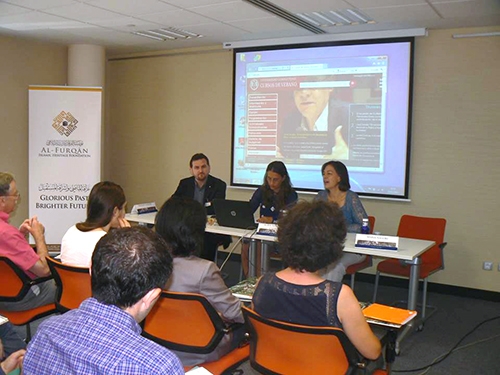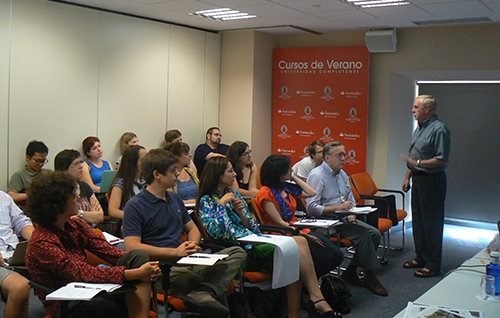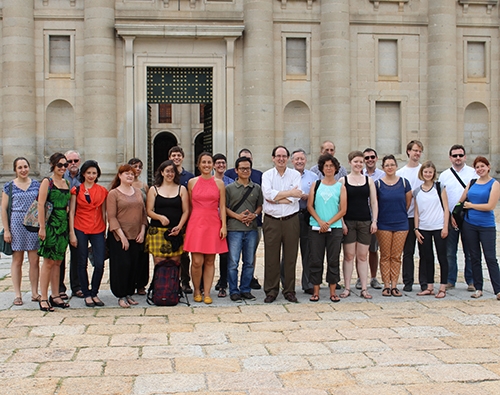The Centre for the Study of Islamic Manuscripts at Al-Furqān Islamic Heritage Foundation, in co-operation with Fundación General de la Universidad Complutense de Madrid, organised the second training course on codicology, titled “Arabic Codicology: The Islamic Handwritten Tradition and its Reception in the El Escorial Collection”.
The training course took place from 20 to 24 July 2015, at San Lorenzo de El Escorial (situated 45km north-west of the capital Madrid, Spain), within the framework of the Complutense University Summer Courses.

The course provided the participants with a substantial introduction to the science of the codicology of Arabic manuscripts and prepared them with the correct methodology for the analysis of Arabic manuscripts in the context of their research. Moreover, participants had the privilege to access one of the most important collections of Arabic manuscripts in Europe (and the largest in Spain), namely the collection of the Royal Library of San Lorenzo monastery in El Escorial.
The course was attended by 16 selected delegates coming from different countries (including the United States of America, Germany, United Kingdom, Spain, France, Italy, Switzerland, Hungary and Indonesia) and specialised in different subject areas involving research on Arabic manuscripts.
The lecturers were among the most prominent experts in the field of Islamic codicology and the history of Arabic manuscripts in Spain, namely Professor Adam Gacek, former Head of the Islamic Studies Library and Faculty Lecturer in Arabic Manuscript Studies at McGill University (Montreal); Professor François Déroche, a specialist in Arabic manuscripts, with a special interest in the history of the written transmission of the Qur’an. He is currently professor at the Collège de France, Paris, where he is chair of 'Histoire du Coran. Texte et transmission'; Professor María Jesús Viguera, professor of Arabic and Islamic Studies at the Complutense University of Madrid and one of the leading figures in the study of Arabic manuscripts in Spanish collections; Dr Nuria Martínez-de-Castilla-Muñoz, lecturer at the Department of Arabic and Islamic Studies of the Complutense University of Madrid, and Fellow at the Warburg Institute (London), also co-ordinator of the course; and José Luis del Valle Merino, director of the Royal Library of San Lorenzo monastery in El Escorial since 1994.
The course was opened on Monday morning, 20 July, by the welcoming words of the course co-ordinator Dr Nuria Martínez-de-Castilla-Muñoz, followed by the greetings from María Nagore Ferrer, vice-rector of the University Extension, Culture and Sport at Complutense University who complimented the course for being remarkably successful and for representing the study area of humanities within the summer courses framework. Mr Sali Shahsivari, Managing Director of Al-Furqān Islamic Heritage Foundation, then thanked the Complutense University for hosting the event, and welcomed the participants. He pointed out the importance of such courses in Europe (and beyond) on the study of the Islamic written heritage and codicology science in general, and the efforts of the Foundation in organising training courses in the sciences of codicology, editing and cataloguing of Islamic manuscripts around the world.
The first lecture, by Dr Nuria Martínez-de-Castilla-Muñoz, introduced the history of the Arabic manuscript collection at the Royal Library of San Lorenzo monastery in El Escorial. This was followed by technical notes on the nature of the collection and other Spanish and Moroccan collections by Professor María Jesús Viguera Molins, and by general remarks on the whole collection of manuscripts at the Royal Library by the director of the library, José Luis del Valle Merino.

The Royal Library in El Escorial, founded by Philip II around 1565, holds a collection of 6,000 manuscripts, including more than 13,000 titles (in Arabic, Hebrew, Greek, Chinese, French, Italian, Catalan, Valencian, Portuguese, Castilian), produced between the 13th and 19th centuries. It also includes 456 incunabula (15th century); 30,000 books printed between the 16th to the 21st centuries; 22 periodical publications; 35,769 archival documents (16th – 19th century), and other sources including music archives, prints, drawings, coinage and medals, account books, and certificates of authenticity of the relics (16th – 19th centuries).
The 5-day-programme consisted of morning sessions dedicated to the theoretical aspects of the study of Arabic manuscripts. In particular, Professor François Déroche discussed writing surfaces and quires; inks and lay-out; illuminations and Arabic bindings; while Professor Adam Gacek introduced types of scripts and hands, including early Arabic scripts, later “proportioned” and regional scripts; and examined examples of ownership statements, seal impressions and other inscriptions.
The afternoon sessions were held at the Royal Library of the monastery of San Lorenzo and consisted of the examination of Arabic manuscripts from the collection. Participants were divided into groups and given manuscripts to analyse in accordance with the elements studied in the morning theoretical sessions, i.e. type of paper, type of script, paratextual elements of the manuscript, illuminations, etc. They were asked to present the findings of their analysis to the other participants and professors, under the guidance of Professor François Déroche, Professor Adam Gacek and Dr Nuria Martínez-de-Castilla.

The course ended on Friday, 24 July, with a lecture by Professor François Déroche on manuscript illuminations. Certificates were given out to the participants and the course was concluded with speeches by Dr Nuria Martínez-de-Castilla and Mr Sali Shahsivari, who thanked the attendees for their active participation on the course and exchange of their experiences as researchers of the Islamic written heritage. Mr Sali Shahsivari concluded by thanking the Complutense University Summer Courses and the El Escorial Library for hosting the event for the second year, wishing to hold it again in 2016.

